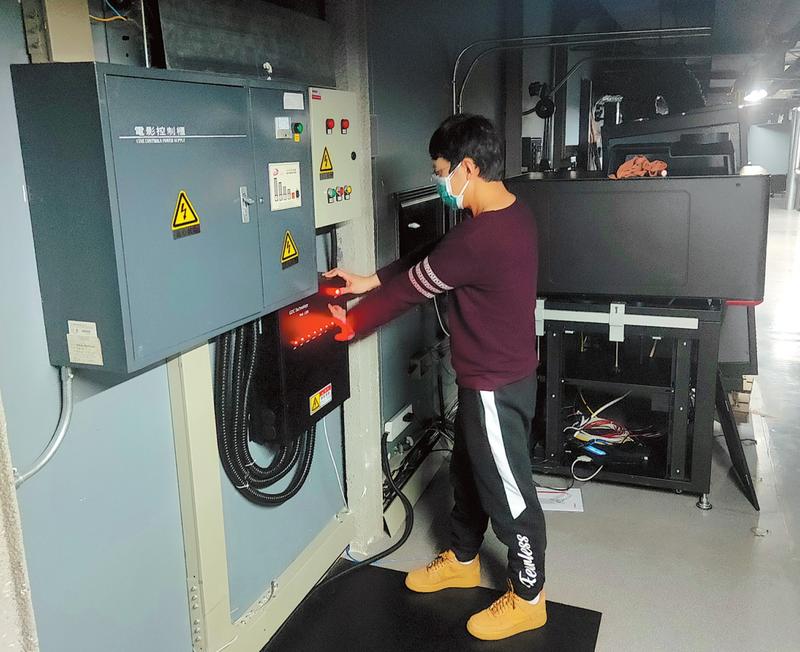Cinemas around the country are facing a long recovery from the market effect of COVID-19, but hope to get the go-ahead to reopen soon, Xu Fan reports.
 A staff member maintains power supply facilities at Capital Cinema in Beijing. The cinema industry has yet to be allowed to resume work. (PHOTO PROVIDED TO CHINA DAILY)
A staff member maintains power supply facilities at Capital Cinema in Beijing. The cinema industry has yet to be allowed to resume work. (PHOTO PROVIDED TO CHINA DAILY)
More than a month since the nationwide closure of thousands of cinemas due to the outbreak of COVID-19, domestic operators in China, the market with world's highest number of screens, are struggling for survival.
With no sign of reopening, some theaters have partly shifted their business focus to e-commerce, exemplified by Wanda-one of the world's largest cinema chains-which is selling snacks and beverages online.
Industry insiders tell China Daily that the food-including ice creams and sausages-were previously prepared for the lucrative Spring Festival holiday.
The days of quarantine have forced us to slow down and concentrate and think about things more deeply ... In terms of cinematic creation, we may discover more inspiration to create more stories
Jia Zhangke, director
As some of the food is approaching its expiration date, they are being sold at a much lower price than usual.
Such an effort, though, is still quite minor compared to the unprecedented financial loss. Aside from enduring the deficit caused by blockbusters pulled from screens during the lucrative Spring Festival vacation-which started on Jan 25-and Valentine's Day, theaters are still facing high expenditure for property rental and staff salaries.
Last year, blockbusters tailored for the seven-day vacation drew around 130 million visits, raking in 5.8 billion yuan (US$836.2 million), which accounted for 9 percent of the total box-office receipts for last year.
Song Bingmei, a manager of Nanning Minzu Cinema in Guangxi Zhuang autonomous region, estimates that her theater has endured a loss worth around 6 million yuan in January and February.
"Before Spring Festival, we heard a lot of acclaim for the upcoming blockbusters during sneak previews. If all of them could have been released and performed well during the holiday season, the one-week revenue was estimated to account for around 10 percent of our yearly income in 2020," says Song.
Now, being shut down, Song's theater has arranged staff on rotational duty to maintain the facilities and do daily cleaning jobs.
"I heard some privately owned theaters are planning to file for bankruptcy. Luckily, our theater can hold out for a longer period. So far, no employee has left the company," adds Song.
Luckily, Song's theater has been exempt from rental fees between February and March, and the fees for April to June will be cut by half. The theater is also working on adjusting the pay for its employees.
Despite not yet knowing when they can resume operation, there is a glimmer of hope for struggling theater operators.
On Feb 23, China Film Distribution and Exhibition Association issued a set of proposals about the preparation for cinemas to reopen, which has quickly stirred mixed reviews online. Most online users say that they are worried that reopening theaters will raise the risk of infection.
Three days later, on Feb 26, Beijing Film Bureau, the city's top sectoral regulator, along with Beijing Center for Disease Prevention and Control, released a more detailed guideline about the theaters' resumption of operation.
 An engineer works to maintain control of equipment at Nanning Minzu Cinema in Guangxi Zhuang autonomous region. (PHOTO PROVIDED TO CHINA DAILY)
An engineer works to maintain control of equipment at Nanning Minzu Cinema in Guangxi Zhuang autonomous region. (PHOTO PROVIDED TO CHINA DAILY)
The guideline requires ticket-buyers in the capital to register their information, including name, address and ID number, during the early phase of reopening.
Additionally, tickets are only allowed to be sold in nonadjacent seats in every other row, and every audience member should wear a mask and sit at least a meter away from their fellow filmgoers.
However, the hope of die-hard fans of returning to theaters has seemingly become ambiguous again. During a media conference held on Feb 27, Chen Bei, deputy secretary-general of Beijing municipal government, said the cinema industry has yet to be allowed to resume work according to the current quarantine situation.
Renowned director Jia Zhangke predicted that the domestic film industry would not recover until June at the earliest during a media event at the 70th Berlin Film Festival in late February, according to the Guangdong-based newspaper Nanfang Metropolis Daily.
Jia estimates that many film companies "may fail to survive with such little income in the first half of this year", but he says that he believes the epidemic will not shrink filmmakers' passion and yearning for artistic creation.
"Instead, the days of quarantine have forced us to slow down and concentrate and think about things more deeply, which we haven't had time to do for a long time. In terms of cinematic creation, we may discover more inspiration to create more stories," Jia is quoted as telling the paper.
Yu Chao, deputy general manager of Capital Cinema in Beijing, estimates the turning point may emerge in late April or early May.
A veteran who has been in the film industry for around two decades, Yu recalls that the cinemas in the Chinese capital were also negatively affected during the SARS outbreak in 2003.
Beijing's cinemas were suspended for around 50 days from late April to early June, but the city's film industry didn't completely recover until November, he says.
"Even when the cinemas were allowed to reopen, audiences may be still unwilling to go into theaters over concerns about risk of infection," says Yu.
Echoing his words, Song from Nanning Minzu Cinema says she believes that the film production companies will not arrange their best movies to be released during the early phase of cinemas reopening.
"Blockbusters tailored for Spring Festival may change the premiere dates to the summer vacation, also one of the most lucrative box-office seasons in our country," she says.
"But the biggest problem is that the summer vacation may be shortened or even canceled, as schools have yet to confirm the date to start a new semester," adds Song.
"In the past, students made up a big proportion of theatergoers during summer. Also, when it comes to children and young teenagers, in most cases they are accompanied by their parents," she explains.
As an effort to curb the novel coronavirus outbreak, Chinese schools and colleges have postponed the start of Spring semester, instead launching online educational programs to teach millions of students at home.
Contact the writer at xufan@chinadaily.com.cn


